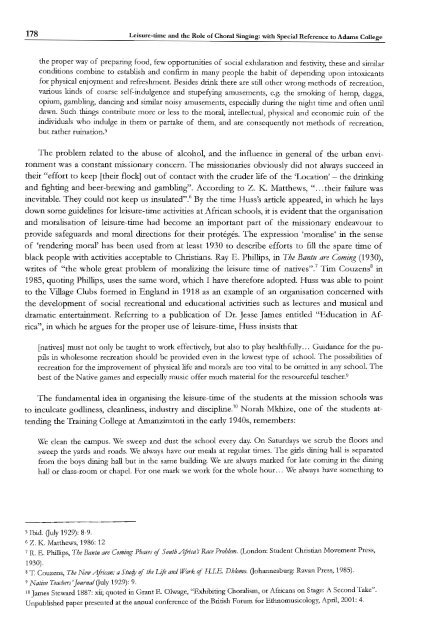South African Choral Music (Amakwaya): Song, Contest and the ...
South African Choral Music (Amakwaya): Song, Contest and the ...
South African Choral Music (Amakwaya): Song, Contest and the ...
You also want an ePaper? Increase the reach of your titles
YUMPU automatically turns print PDFs into web optimized ePapers that Google loves.
178 Leisure-time <strong>and</strong> <strong>the</strong> Role of <strong>Choral</strong> Singing: with Special Reference to Adams College<br />
<strong>the</strong> proper way of preparing food, few opportunities of social exhilaration <strong>and</strong> festivity, <strong>the</strong>se <strong>and</strong> similar<br />
conditions combine to establish <strong>and</strong> conftrm in many people <strong>the</strong> habit of depending upon intoxicants<br />
for physical enjoyment <strong>and</strong> refreshment. Besides drink <strong>the</strong>re are still o<strong>the</strong>r wrong methods of recreation,<br />
various kinds of coarse self-indulgence <strong>and</strong> stupefying amusements, e.g. <strong>the</strong> smoking of hemp, dagga,<br />
opium, gambling, dancing <strong>and</strong> similar noisy amusements, especially during <strong>the</strong> night time <strong>and</strong> often until<br />
dawn. Such things contribute more or less to <strong>the</strong> moral, intellectual, physical <strong>and</strong> economic ruin of <strong>the</strong><br />
individuals who indulge in <strong>the</strong>m or partake of <strong>the</strong>m, <strong>and</strong> are consequently not methods of recreation,<br />
but ra<strong>the</strong>r ruination.s<br />
The problem related to <strong>the</strong> abuse of alcohol, <strong>and</strong> <strong>the</strong> influence in general of <strong>the</strong> urban environment<br />
was a constant missionary concern. The missionaries obviously did not always succeed in<br />
<strong>the</strong>ir "effort to keep [<strong>the</strong>ir flock] out of contact with <strong>the</strong> cruder life of <strong>the</strong> 'Location' - <strong>the</strong> drinking<br />
<strong>and</strong> fighting <strong>and</strong> beer-brewing <strong>and</strong> gambling". According to Z. K. Mat<strong>the</strong>ws, " ...<strong>the</strong>ir failure was<br />
inevitable. They could not keep us insulated".6 By <strong>the</strong> time Huss's article appeared, in which he lays<br />
down some guidelines for leisure-time activities at <strong>African</strong> schools, it is evident that <strong>the</strong> organisation<br />
<strong>and</strong> moralisation of leisure-time had become an important part of <strong>the</strong> missionary endeavour to<br />
provide safeguards <strong>and</strong> moral directions for <strong>the</strong>ir proteges. The expression 'moralise' in <strong>the</strong> sense<br />
of 'rendering moral' has been used from at least 1930 to describe efforts to fill <strong>the</strong> spare time of<br />
black people with activities acceptable to Christians. Ray E. Phillips, in The Bantu are Coming (1930),<br />
writes of "<strong>the</strong> whole great problem of moralizing <strong>the</strong> leisure time of natives".? Tim Couzens 8<br />
in<br />
1985, quoting Phillips, uses <strong>the</strong> same word, which I have <strong>the</strong>refore adopted. Huss was able to point<br />
to <strong>the</strong> Village Clubs formed in Engl<strong>and</strong> in 1918 as an example of an organisation concerned with<br />
<strong>the</strong> development of social recreational <strong>and</strong> educational activities such as lectures <strong>and</strong> musical <strong>and</strong><br />
dramatic entertainment. Referring to a publication of Dr. Jesse James entitled "Education in Af<br />
rica", in which he argues for <strong>the</strong> proper use of leisure-time, Huss insists that<br />
[natives] must not only be taught to work effectively, but also to play healthfully... Guidance for <strong>the</strong> pupils<br />
in wholesome recreation should be provided even in <strong>the</strong> lowest type of school. The possibilities of<br />
recreation for <strong>the</strong> improvement of physical life <strong>and</strong> morals are too vital to be omitted in any school. The<br />
best of <strong>the</strong> Native games <strong>and</strong> especially music offer much material for <strong>the</strong> resourceful teacher. 9<br />
The fundamental idea in organising <strong>the</strong> leisure-time of <strong>the</strong> students at <strong>the</strong> mission schools was<br />
to inculcate godliness, cleanliness, industry <strong>and</strong> discipline. lO Norah Mkhize, one of <strong>the</strong> students attending<br />
<strong>the</strong> Training College at Amanzimtoti in <strong>the</strong> early 1940s, remembers:<br />
We clean <strong>the</strong> campus. We sweep <strong>and</strong> dust <strong>the</strong> school every day. On Saturdays we scrub <strong>the</strong> floors <strong>and</strong><br />
sweep <strong>the</strong> yards <strong>and</strong> roads. We always have our meals at regular times. The girls dining hall is separated<br />
from <strong>the</strong> boys dining hall but in <strong>the</strong> same building. We are always marked for late coming in <strong>the</strong> dining<br />
hall or class-room or chapel. For one mark we work for <strong>the</strong> whole hour... We always have something to<br />
5 Ibid. Ouly 1929): 8-9.<br />
6 Z. K. Mat<strong>the</strong>ws, 1986: 12<br />
7 R. E. Phillips, The Bantu are Coming: Phases of <strong>South</strong> Africa} Race Problem. (London: Student Christian Movement Press,<br />
1930).<br />
8 T. Couzens, The New <strong>African</strong>: a Stu4J of <strong>the</strong> Life <strong>and</strong> Work of H.LE. Dhlomo. Oohannesburg: Ravan Press, 1985).<br />
9 Native Teachers' Journal Ouly 1929): 9.<br />
10 lames Steward 1887: xii; quoted in Grant E. Olwage, "Exhibiting <strong>Choral</strong>ism, or <strong>African</strong>s on Stage: A Second Take".<br />
Unpublished paper presented at <strong>the</strong> annual conference of <strong>the</strong> British Forum for Ethnomusicology, April, 2001: 4.

















